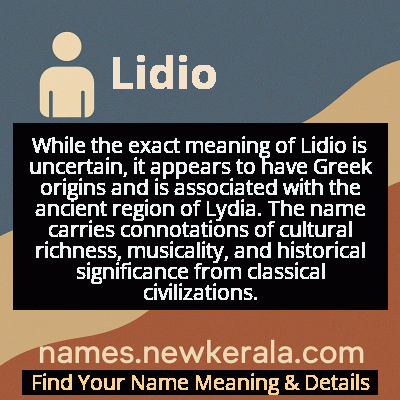Lidio Name Meaning & Details
Origin, Popularity, Numerology Analysis & Name Meaning of Lidio
Discover the origin, meaning, and cultural significance of the name LIDIO. Delve into its historical roots and explore the lasting impact it has had on communities and traditions.
Name
Lidio
Gender
Male
Origin
Greek
Lucky Number
4
Meaning of the Name - Lidio
While the exact meaning of Lidio is uncertain, it appears to have Greek origins and is associated with the ancient region of Lydia. The name carries connotations of cultural richness, musicality, and historical significance from classical civilizations.
Lidio - Complete Numerology Analysis
Your Numerology Number
Based on Pythagorean Numerology System
Ruling Planet
Uranus (Rahu)
Positive Nature
Strong sense of order, loyal, practical, and disciplined.
Negative Traits
Stubborn, overly serious, rigid, and prone to feeling restricted.
Lucky Colours
Blue, gray.
Lucky Days
Saturday.
Lucky Stones
Blue sapphire.
Harmony Numbers
1, 7, 8.
Best Suited Professions
Managers, engineers, accountants, organizers.
What People Like About You
Dependability, discipline, practicality.
Famous People Named Lidio
Lidio Andreozzi
Composer and Musician
Renowned Italian composer known for his contributions to classical and contemporary music
Lidio Mai
Athlete
Professional rugby player known for his exceptional sportsmanship and team leadership
Lidio Cipriani
Anthropologist
Noted for his ethnographic research and studies of indigenous cultures
Name Variations & International Equivalents
Click on blue names to explore their detailed meanings. Gray names with will be available soon.
Cultural & Historical Significance
The name's journey through history reflects the movement of cultures across the Mediterranean basin. As it traveled from ancient Greek contexts to Roman and later Italian usage, it accumulated layers of meaning while retaining its core association with artistic and cultural excellence. In modern times, the name serves as a living connection to ancient civilizations, offering bearers a sense of historical continuity and cultural pride. Its relative rarity adds to its distinctive character, making it a choice for those who value uniqueness alongside cultural depth.
Extended Personality Analysis
Individuals named Lidio are often perceived as creative, intuitive, and possessing a natural artistic sensibility. They tend to be deep thinkers with a strong appreciation for beauty and harmony in their surroundings. Lidios typically exhibit a balanced personality—both practical and imaginative, able to navigate the world with both logical reasoning and emotional intelligence. They are often described as loyal friends and partners who value meaningful connections. Their creative nature may manifest in various forms, from artistic pursuits to innovative problem-solving in professional contexts.
Lidios generally possess a calm demeanor but can be passionately expressive when discussing topics they care deeply about. They often show remarkable adaptability, able to thrive in both structured environments and more creative, fluid situations. Their intuitive nature helps them understand people and situations quickly, making them excellent mediators and collaborators. While they may appear reserved at first, Lidios typically have rich inner lives and form deep, lasting relationships with those who appreciate their unique perspective and creative spirit. Their combination of practicality and imagination often leads them to success in fields that require both technical skill and creative vision.
Modern Usage & Popularity
In contemporary times, Lidio remains a relatively rare but distinctive name, primarily found in Italian-speaking regions and among communities with Greek heritage. Its usage has seen a slight resurgence in recent years as parents seek unique names with classical roots. The name maintains a sophisticated, artistic image and is often chosen by families with appreciation for cultural history and musical traditions. While not among the most popular names, its uniqueness makes it memorable, and it continues to be used by parents looking for a name that stands out while maintaining cultural depth and elegance. The name's distribution remains concentrated in Southern Europe, though global migration patterns have spread its usage to other continents, particularly in communities with Italian or Greek diaspora populations.
Symbolic & Spiritual Meanings
Symbolically, Lidio represents creativity, harmony, and cultural richness. The name evokes images of ancient civilizations and artistic achievement, symbolizing a bridge between past and present. It carries connotations of musicality and aesthetic appreciation, suggesting an individual who brings beauty and harmony to their environment. The name also symbolizes resilience and endurance, reflecting the lasting legacy of the cultures it references. In metaphorical terms, Lidio represents the fusion of practical wisdom with artistic sensibility—a balance between earthly concerns and higher aspirations. The name suggests someone who can navigate both the practical demands of life and the realm of creative expression, embodying the ideal of the Renaissance person who excels in multiple domains.

